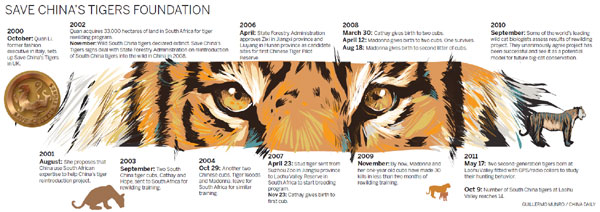A long-lasting love affair with big cats
Updated: 2013-07-27 09:39
By Yang Yao (China Daily)
|
|||||||||||
Beijing native gave up corporate life to protect nature's beautiful creatures
Quan Li, a Beijing native, was once the head of Gucci's worldwide licensing business. Thirteen years ago she gave up her career in the fashion industry to live in the bushes of South Africa with the tigers.
|
 |
She said that instead of creating man-made beauty, she wants to preserve natural beauty.
She has a long-lasting love affair with cats that stretches back to her childhood.
After graduating from Peking University in the 1980s, Quan moved to Belgium with her first husband.
Later on, she divorced, moved to the United States and received her MBA at Wharton School of the University of Pennsylvania, remarried, and then moved again and again from one country to another.
Although many things have changed, her passion for cats, which she regards as "the most beautiful creatures in nature", remains.
A trip to Namibia in the summer of 1998 inspired Quan to protect threatened big cat species.
In 2000, she convinced her husband at that time to help fund the Save China's Tigers Foundation in London.
"South China Tigers are on the verge of extinction," she said. "Vast land, a rich prey base and excellent wildlife expertise could save them."
In cooperation with the State Forestry Administration, five tigers from zoos in China were sent to Africa.
The second generation of these tigers has given birth to cubs, bringing the number of Chinese tigers at her South African reserve to 14. The tigers have acquired the skills to live and hunt in the wild.
|
 |
However, as she is filing for a divorce from her current husband, she is starting a new foundation called China Tiger Revival. "South China tigers are still our current focus, as they are the most endangered subspecies of tiger and the most ignored by the conservation world," she said.
"The tiger is at the top of the food chain. Saving the tiger would also save other animals in the chain by protecting the tigers' habitat. Setting up a pilot reserve in areas where wild tigers might still exist will also help protect bears, leopards, wild boars, antelopes and wild goats."
Related Stories
Newborn tiger cubs make debut in C China 2013-07-04 09:29
Wild Siberian tiger eats oxes in NE China 2013-06-26 17:13
Dogs feeding baby tigers in Shanghai zoo 2013-06-20 20:19
Marauding Siberian tigers kill livestock 2013-05-10 07:54
Triple joy for Siberian tiger 2013-04-19 10:50
Today's Top News
Chinese developer buys LA site for $1b project
Snowden faces another 6 months in limbo: official
Arrival of China tigers put on hold
Deadly NE China fire an act of arson: police
Hot times for travel agents
China, Russia boost ties with joint drills
Sovereign fund sees 10.6% return
19 industries to shed capacity
Hot Topics
Lunar probe , China growth forecasts, Emission rules get tougher, China seen through 'colored lens', International board,
Editor's Picks

|

|

|

|

|

|





